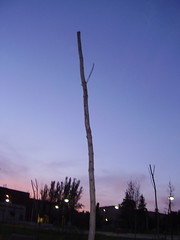archives of melodies, laughter, accents & bad hair
It was quite a journey from Historical Voices to YouTube. I started off listening to William Jennings Bryan's "Cross of Gold Speech," enjoying his warm yet no-nonsense voice, and ended up watching a video of a local Salvadoran band, shot with a predictable fisheye lens. I found it more difficult than ever to stay focused on the original question this week. After a few hours to collect my thoughts, however, I became interested in what it was exactly about the material that made it so easy for me to lose my way.
I think more than anything it has to do with lack of practice. Digital collections of oral histories make interviews available across the world that might have been sitting quietly in a dusty drawer. For someone who is accustomed to working with text rather than voices, it might take some time to develop new skills to "highlight" relevant information. The Black Oral History project on the Washington State digital sound archive makes interviews accessible in a variety of ways. Each interview is accompanied by a kind of abstract that identifies the person, the date of the interview, and (importantly) an outline of the topics brought up during the interview. What I found particularly impressive about the outline is that the topics are linked to other interviews. For example, clicking on the topic "voting" will take you to the result page with all the other interviews with people who talk about that same topic. This linkage of information would have been a little clumsy in a written format, like an index. On the database it seems to be the logical thing to do. I found this to work much better in the African American Oral History collection of Washington State than in Historical Voices (the "transcript" option on the website did not work on my computer, although I was surprised to learn that I didn't need it too much).
I think it's also important to make a distinction between audio-visual material and audio-visual material on the internet. When I watch a documentary on a DVD or on television, I do not try to find out about it until afterwards, if at all. Even when I listen to the radio, or a recording, I am much more passive. I receive the information, I think about it (maybe) and later I try to find out more about where it came from and why (sometimes). But today I caught myself wandering into Wikipedia, or simply googling key terms, again and again to shed further light on what I was listening to or seeing on another screen. I know we should be all for engagement and actively shaping how you receive information, and the internet is good for that - but it also makes it a lot easier to simply forget where you started and why.


0 Comments:
Post a Comment
<< Home